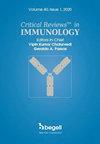基于 WGCNA 和机器学习的慢性肾病炎症相关诊断标记物探索
IF 0.9
4区 医学
Q4 IMMUNOLOGY
引用次数: 0
摘要
慢性肾脏病(CKD)是一种与炎症通路相关的常见疾病,但其有效治疗仍然有限。本研究旨在利用生物信息学分析找到可能成为慢性肾脏病治疗靶点的诊断标志物。研究人员从 GEO 数据库中筛选了 CKD 微阵列数据集,并对 CKD 数据集 GSE98603 中的差异表达基因(DEGs)进行了分析。基因组变异分析(GSVA)用于探索炎症通路和样本的活性评分。加权基因共表达网络分析(WGCNA)和 Lasso 等算法用于筛选与炎症相关的 CKD 诊断标记物。然后对炎症相关的 DEGs 进行功能富集分析。通过 ROC 曲线检验了炎症相关枢纽基因的诊断价值。最后,实时定量 PCR 进一步验证了生物信息学的预测。研究共获得 71 个与炎症相关的 DEGs,其中 5 个是枢纽基因。富集分析表明,这些基因明显富集于炎症相关通路(NF-κB、JAK-STAT 和 MAPK 信号通路)。ROC曲线显示,5个CKD诊断标志物(TIGD7、ACTA2、ACTG2、MAP4K4和HOXA11)也具有良好的诊断价值。此外,在 LPS 诱导的 HK-2 细胞中,TIGD7、ACTA2、ACTG2 和 HOXA11 表达下调,而 MAP4K4 表达上调。本研究发现TIGD7、ACTA2、ACTG2、MAP4K4和HOXA11是可靠的CKD诊断标志物,从而为临床治疗中进一步了解CKD提供了依据。本文章由计算机程序翻译,如有差异,请以英文原文为准。
Exploration of Diagnostic Markers Associated with Inflammation in Chronic Kidney Disease Based on WGCNA and Machine Learning
Chronic kidney disease (CKD) is a common disorder related to inflammatory pathways; its effective management remains limited. This study aimed to use bioinformatics analysis to find diagnostic markers that might be therapeutic targets for CKD. CKD microarray datasets were screened from the GEO database and the differentially expressed genes (DEGs) in CKD dataset GSE98603 were analyzed. Gene set variation analysis (GSVA) was used to explore the activity scores of the inflammatory pathways and samples. Algorithms such as weighted gene co-expression network analysis (WGCNA) and Lasso were used to screen CKD diagnostic markers related to inflammation. Then functional enrichment analysis of inflammation-related DEGs was performed. ROC curves were conducted to examine the diagnostic value of inflammation-related hub-genes. Lastly, quantitative real-time PCR further verified the prediction of bioinformatics. A total of 71 inflammation-related DEGs were obtained, of which 5 were hub genes. Enrichment analysis showed that these genes were significantly enriched in inflammation-related pathways (NF-κB, JAK-STAT, and MAPK signaling pathways). ROC curves showed that the 5 CKD diagnostic markers (TIGD7, ACTA2, ACTG2, MAP4K4, and HOXA11) also exhibited good diagnostic value. In addition, TIGD7, ACTA2, ACTG2, and HOXA11 expression was downregulated while MAP4K4 expression was upregulated in LPS-induced HK-2 cells. The present study identified TIGD7, ACTA2, ACTG2, MAP4K4, and HOXA11 as reliable CKD diagnostic markers, thereby providing a basis for further understanding of CKD in clinical treatments.
求助全文
通过发布文献求助,成功后即可免费获取论文全文。
去求助
来源期刊
CiteScore
2.60
自引率
0.00%
发文量
14
审稿时长
>12 weeks
期刊介绍:
Immunology covers a broad spectrum of investigations at the genes, molecular, cellular, organ and system levels to reveal defense mechanisms against pathogens as well as protection against tumors and autoimmune diseases. The great advances in immunology in recent years make this field one of the most dynamic and rapidly growing in medical sciences. Critical ReviewsTM in Immunology (CRI) seeks to present a balanced overview of contemporary adaptive and innate immune responses related to autoimmunity, tumor, microbe, transplantation, neuroimmunology, immune regulation and immunotherapy from basic to translational aspects in health and disease. The articles that appear in CRI are mostly obtained by invitations to active investigators. But the journal will also consider proposals from the scientific community. Interested investigators should send their inquiries to the editor before submitting a manuscript.

 求助内容:
求助内容: 应助结果提醒方式:
应助结果提醒方式:


